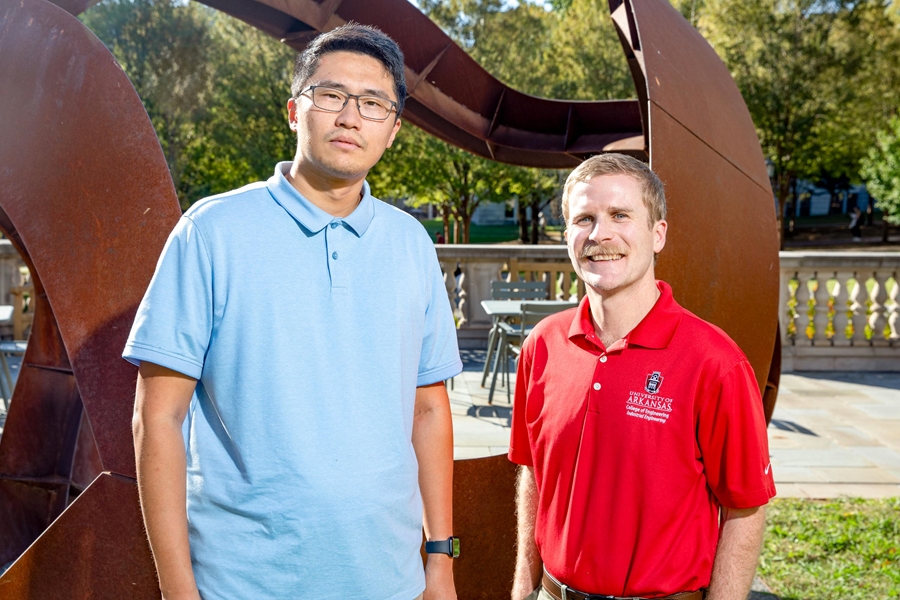Science
University of Arkansas Researchers Awarded $588K for Network Protection Study

The U.S. Air Force Office of Scientific Research has awarded approximately $588,000 to two researchers from the University of Arkansas to investigate the role of information in safeguarding critical networks during disruptive events. The project, led by assistant professors of industrial engineering Haoming Shen and Robert Curry, seeks to develop mathematical models that will enhance the collection, sharing, and protection of information in crises such as natural disasters or cyberattacks.
The research aims to understand how the flow and accuracy of information directly impact a community’s ability to respond effectively to disruptions. The team will also focus on strategies for the optimal allocation of limited resources, including sensors and drones, to detect threats and protect essential infrastructure.
Key Research Questions and Approaches
Shen and Curry will address two critical questions in their study:
1. How can defenders utilize information to anticipate and identify potential attacks?
2. In what ways can misinformation or strategic information sharing be employed to deter threats?
Curry explained the project in simpler terms: “If we put it in non-mathematical terms, we’re trying to make a set of data-informed decisions, and we’re trying to make those decisions with uncertain information.”
While the research will primarily involve theoretical modeling, the findings have the potential to inform future crisis planning and infrastructure protection, especially within transportation and logistics networks.
Shen emphasized the importance of proactive measures: “We want to configure sensor networks to detect any potential disruptions in our network. However, deploying sensors or conducting sensing tasks requires investment, and the total amount of a budget is always limited. So we want to identify the best strategies to allocate resources and to detect these attacks while strategically protecting our infrastructure.”
Support and Future Implications
The funding for this project comes through the Defense Established Program to Stimulate Competitive Research (DEPSCoR), which is a Department of Defense initiative designed to bolster research capacities at universities in underrepresented states.
U.S. Senator John Boozman, a supporter of DEPSCoR, stated, “This project provides an opportunity to pursue high-quality research with real-world applications like protecting critical infrastructure. Investing in this project reinforces and enhances our largest institution’s significant role in supporting national security.”
In addition to this funding, the University of Arkansas announced in October 2023 that it has joined a national research team focused on developing advanced video object tracking technology under a contract from the Defense Advanced Research Projects Agency (DARPA), which could yield up to $6 million in federal funding for the university.
This ongoing research reflects a commitment to enhancing infrastructure resilience and protecting communities from emerging threats, marking a significant step in the intersection of technology and national security.
-

 Lifestyle4 months ago
Lifestyle4 months agoLibraries Challenge Rising E-Book Costs Amid Growing Demand
-

 Sports3 months ago
Sports3 months agoTyreek Hill Responds to Tua Tagovailoa’s Comments on Team Dynamics
-

 Sports3 months ago
Sports3 months agoLiverpool Secures Agreement to Sign Young Striker Will Wright
-

 Lifestyle3 months ago
Lifestyle3 months agoSave Your Split Tomatoes: Expert Tips for Gardeners
-

 Lifestyle3 months ago
Lifestyle3 months agoPrincess Beatrice’s Daughter Athena Joins Siblings at London Parade
-

 World3 months ago
World3 months agoWinter Storms Lash New South Wales with Snow, Flood Risks
-

 Science4 months ago
Science4 months agoTrump Administration Moves to Repeal Key Climate Regulation
-

 Science3 months ago
Science3 months agoSan Francisco Hosts Unique Contest to Identify “Performative Males”
-

 Business4 months ago
Business4 months agoSoFi Technologies Shares Slip 2% Following Insider Stock Sale
-

 Science4 months ago
Science4 months agoNew Tool Reveals Link Between Horse Coat Condition and Parasites
-

 Sports4 months ago
Sports4 months agoElon Musk Sculpture Travels From Utah to Yosemite National Park
-

 Science4 months ago
Science4 months agoNew Study Confirms Humans Transported Stonehenge Bluestones









